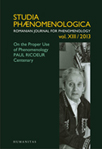Traversées de la violence
Traversées de la violence
Author(s): Marc CréponSubject(s): Philosophy
Published by: Societatea Română de Fenomenologie
Keywords: Violence; Non-Violence; Gandhi; Murderous Consent;
Summary/Abstract: At the end of the Second World War, the fi gure of Gandhi haunts political philosophy as it wrestles with the task of justifying violence in the name of history. Th e story begins with Arthur Koestler’s Darkness at noon in 1938. Gandhi’s name appears during a discussion between Roubachof and Ivanof. A few years later (1946), Koestler publishes in French a book entitled Le Yogi et le commissaire, analysed by Merleau-Ponty in Humanisme et terreur (1946–1947). Camus replies in L’Homme révolté (1951). Ricoeur’s thinking, examined in the present article, has its own place in this debate. At stake is our own knowledge of the conditions under which the rejection and condemnation of violence might, in fact, accommodate violence.
Journal: Studia Phaenomenologica
- Issue Year: XIII/2013
- Issue No: 13
- Page Range: 283-294
- Page Count: 12
- Language: French
- Content File-PDF

